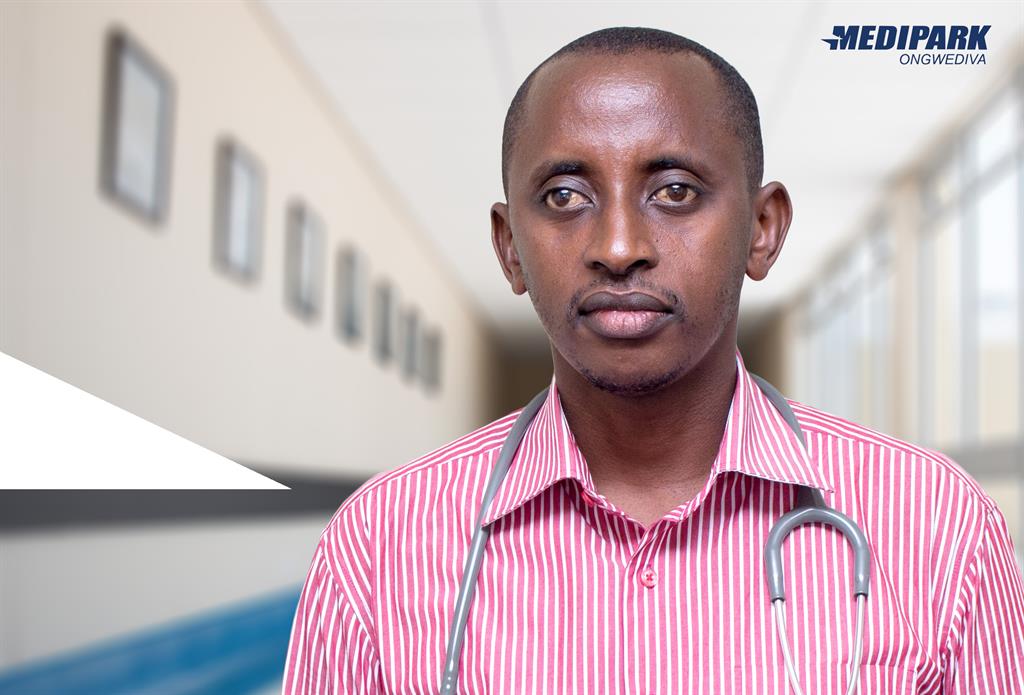Specialising in skin
Dr Elisah Agaba loves the way skin acts as "a mirror" of what is happening inside the body.
Dr Elisah Agaba is a consultant dermatologist at the Ongwediva Medipark university teaching hospital.He is also a senior adjunct lecturer of dermatology at the University of Namibia (Unam).
His duties include providing medical care to patients with skin-related diseases and problems.
He deals with outpatients. These are patients who are treated and go back home.
There are also patients who are admitted to hospital with skin-related diseases. They are seen on a daily basis, until they are discharged.
Dr Agaba also does consulting, which means colleagues call him to ask his opinion.
His role as a Unam lecturer includes giving dermatology lectures to medical students, giving assignments and marking them, giving continuous medical education (CME) presentations to other health professionals and the mentorship of medical students
A normal day for Dr Agaba starts with seeing his admitted patients first.
He then goes to the outpatient department to see his booked patients, while receiving consulting calls from some of his colleagues. Surgical and cosmetic procedures are booked for specific days and hours, and so too are student teaching and assignments.
He says he was inspired to work with people of all ages.
“I wanted a specialty where you see all age groups. You joke with kids, listen to unending stories and complaints from the elderly and attend to the overconfidence of the youth. It is truly amazing,” he said.
He also loves the way skin acts as "a mirror" of what is happening inside the body.
“It’s a pleasure to diagnose a systemic disease. For example, a problem in the brain can be detected because of what appears on the skin, while the patient had no brain complaint. This helps treat systemic diseases before they become symptomatic, hence there is a better prognosis,” he added.
Dr Agaba graduated as a general practitioner after seven years of medical training. He then worked for two years as a general practitioner.
He then started attending the University of Witwatersrand in Johannesburg in 2010 for his specialist training and graduated in 2014 as a consultant dermatologist.
“When you are training, you see patients at university teaching hospitals. In my case, it was Charlotte Maxeke Johannesburg Academic Hospital, Chris Hani Baragwaneth Academic Hospital and Helen Joseph Academic Hospital, but you are under supervision. You ask consultants and professors in the department,” Dr Agaba said.
“In order to qualify, one writes exams, which includes written papers and oral exams, as well as microscopic exams. The written exams are in two parts.
“Part one is three written papers, part two is two written papers, an oral exam which is on patients (in general it’s five to 10 patients you evaluated) and a microscopic exam (six slides you look at to make diagnoses).
“All exams are set by the Colleges of Medicine of South Africa (CMSA). After passing the exams I submitted my research report (thesis), which was evaluated by the university administration,” Dr Agaba added.
Some of the character traits needed in his profession include patience, because most skin diseases take a long time to heal, a love for paying attention to detail and a knack for embracing diversity.
“The highlights of my work have to be diagnosing internal diseases based on skin signs and the few emergencies, which give an opportunity to plan my work accordingly. The field is also a very enjoyable one, with plenty of opportunities to see patients in all medical fields.”




Comments
My Zone
No comments have been left on this article